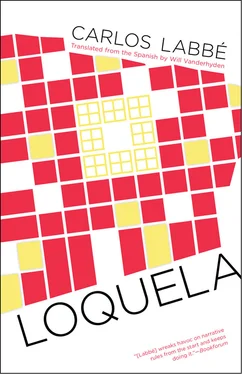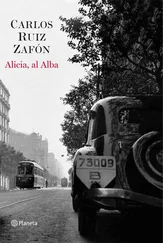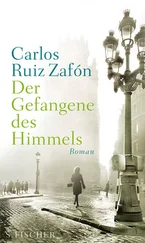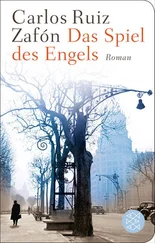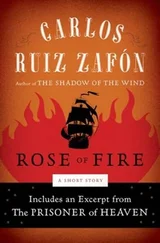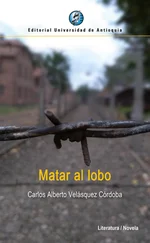Carlos got up to go to the bathroom. While brushing his teeth he yelled to Josefina to put the albums back in order. Elisa had told him once that, when she was little, she’d thought she was adopted too, all because her older siblings liked to bug her with jokes about her dark hair and nearly nonexistent nose. Since she wasn’t blonde, she wasn’t part of the family, they’d repeat. And she invented an alternate identity so as not to feel hurt: her name was Carolina, a name that in her childhood she found particularly melodious for some now faded reason, a name given by her true parents, benevolent people who lived in another place, in the country of the good people. One day she was playing with her ten siblings in the garden of a house that looked a lot like the gingerbread house she’d seen in an illustration of Hansel and Gretel, when the imaginary country was invaded by the neighboring bloodthirsty nation. Her parents were killed in the upheaval and, in an act of desperation, the firstborn brother loaded her and all her siblings onto a boat, and they were able to make their escape. Indescribable adventures led them to many of the world’s ports, where different families would grow fond of one of the siblings and beg the firstborn to let them adopt the child: who wouldn’t want to raise one of the last remaining children from the country of the benevolent people? The firstborn believed he’d be able to ensure the happiness of all his siblings, giving them away one by one to interested parents, and yet he wasn’t always successful; often the natural children of these adoptive families were envious of their kindly nature and teased them, like what happened to her in Viña del Mar when she was taken in by new parents, given a new name. With time, Elisa had come to understand that she was just as boring as her siblings and didn’t really belong to some benevolent race. And yet, as long she was unable to come up with a just fate for the oldest brother, she would never forget this children’s story: she imagined him in the most absolute solitude, old and dejected on a dilapidated boat, looking out at the immensity of the ocean before the breaking of the storm.
September 13 th
Still too tired to really get into it. And yet it’s important that I continue to record the unbelievable storyline of these days; without ceasing to read, without ever closing a book, I decide to go out into the street to recover whatever is still alive of Violeta Drago in this city. It’s stopped raining at last, the dark clouds have receded, and the days are getting lighter. Without purporting to get up from this chair or put away this notebook, I spend the days walking toward Pedro Valdivia Norte, the neighborhood where Violeta’s house is located. Friday I was leaning on the railing of my apartment balcony, not moving; the whole afternoon I was in that same position, staring dangerously at the ground, many floors below. None of the solutions seemed right to me: not the morbidity of Arguedas and Lihn writing their death diaries, not Onetti and Violeta inventing a city where they run away from their own ruin, and in whose streets their characters find no relief from suffering, but do find oblivion. Keeping in mind that the impudence in these pages was my solitude’s only saving grace, aware too that I write these lines to be read, hoping only that someone will be able to understand what I cannot. With the suicidal compulsion to put this notebook in an envelope and send it to J’s address. But I already said that she’s going to disappear, like me in front of a desk, surrounded by towers of books and worn-out pens, piling up. Only Alicia, because the name I’ve given her here isn’t her name and doesn’t do her justice, will survive. (I realize that she doesn’t fit here, that she can only look in and never enter entirely, or follow along for a few pages, because this notebook is in error, hardly one true word.) Just Alicia versus The Little One. Alicia during the day and The Little One late at night: me, drunk, I can’t help it that first one and then the other appear on my right, on my left; my uneven Manichean vision. And like Carlos, I try to bring them together in an embrace, as if I were the center of everything: me and my pen describing this three-way relationship such that The Little One, lying down, was reading a story in which the protagonist pays for her parents’ nursing-care by working as a whore, exclusively group encounters. That’s what The Little One said to me, the one who was reading an anthology of stories and poems for a writing workshop at a university in some southern city. In Neutria.
When I rang the doorbell at the house on Calle Los Araucanos, it was she, The Little One, who appeared. She asked me what I wanted: she was holding a book in her hands, dressed in pajamas, her short hair in disarray. I lied, telling her I was Violeta’s friend. She returned my look, disbelieving, had I come from the south perhaps, she said. The south? Why the south? Your naivety is infinite, she repeated all night long, when she wasn’t biting me. In that moment I said yes, somewhat inhibited by the brightness of the house, by the decorations Violeta and The Little One’s grandmother had used, by the silverware, by the ceramic animals, the fake ivory, the yellow lamps, and the acrylic plants. The Little One put the teapot in the kitchen and led me to her room. Her grandmother wasn’t home. Had she been waiting for me? Had she been waiting for someone else? The unease on her face when she took off my clothes, she’d probably felt obligated to open the gate when I told her I was Violeta’s friend. Then I asked her if they really were cousins. (Why does she live in Violeta’s house and stay in her room, so talkative, such short bones and rapid movements, the opposite of the figure that weeks of reading Violeta’s infernal handwriting had created for me?) Yes, of course, The Little One said: Yeah right. And she went into the bathroom. I stayed erect. I was entering another body, another city, at last I was emerging from the pit, I say, of this apartment.
Hours later she came out of the bathroom, drying her hands, and asked me my name. Carlos, I continued to lie, as if that very afternoon I hadn’t been pulled from paralysis by Alicia’s phone call: she told me it was important that we see each other, not about Violeta or my novel, but about her and about me. (About us, responding without being cheeky.) As if I hadn’t spent that very day thinking about putting a bullet in J for what she’d said to me when I called her, ready to start over. As if I hadn’t spent an eternity leaning on the railing, watching the raindrops fall more heavily than yesterday and the day before, playing with the idea of locking myself in my room, not sleeping not eating not watching TV, not waiting for the days to fabricate this book for me, but forcing myself, like a maniac, to write a facsimile-novel of A Brief Life , substituting my own presence for Brausen, J for Gertrudis, Santiago for Buenos Aires, and Neutria for Santa María, but never finding in that facsimile-novel a character corresponding to Alicia, to her role of impartiality. Then she called me. I put on gloves and a scarf, expecting that it’d be another afternoon of indecisive conversation; Alicia would try to keep me from getting obsessed with her (or with her friend of the notebooks), I’d want to believe that her teasing was intended to get me to make the first move, to stand up and kiss her and pull her far away from this dusty city with my madness: I exited the elevator promising myself I’d destroy all of it after a few beers. Of course she’d react to my violence, which would at least give rise to a story of another sort. But no, it was preferable for me to remain still, hearing her neutrally over the telephone. I thought that Carlos, that he would act in the exact opposite way that I do. That I should have never given Violeta’s letter to Alicia, since it was addressed me. I closed the umbrella, raised my hand. The micro that was coming, splashing pedestrians, wasn’t the Providencia micro , it was the one that went down Kennedy directly to Pedro de Valdivia Norte. The moment I got on it I became someone else: with the certainty of having stood Alicia up, I stopped in front of the door to the house on Los Araucanos and asked for Violeta. I regret nothing, I regret nothing.
Читать дальше
